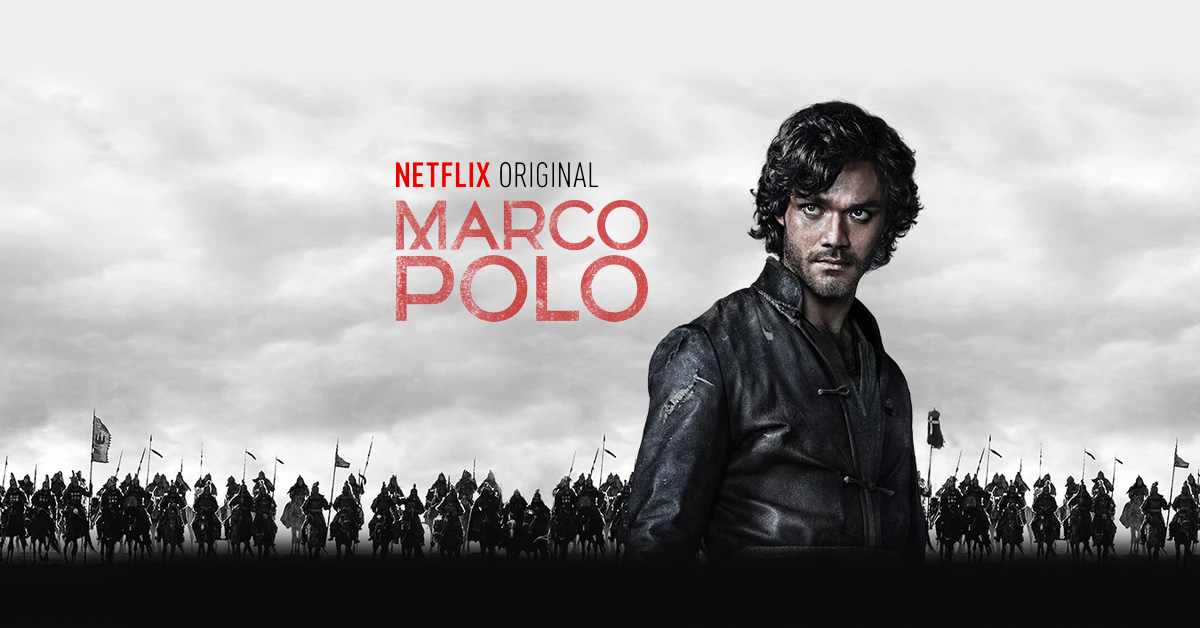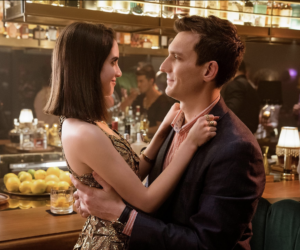The screen is black as the deep, throaty sounds of Mongolian chanting loom in the darkness. Then, the wail of a Chinese erhu soars; the blackness reveals itself as a massive river of ink slowly and powerfully swallowing up blank paper, as inevitable as the forces of change that constantly transform this world. This is the title sequence of Marco Polo, Netflix’s new extravaganza of a historical epic that premiered on Netflix Instant on December 12th (when you were studying—or rather, pretending to study—for finals).
http://i.kinja-img.com/gawker-media/image/upload/s–MURzKbK2–/roe1tmaynxrqwk4ezsup.gif
The show is a lush Game of Thrones-esque production, and while I have not actually watched GoT (I know, half of campus would disinherit me), the sheer amount of nudity and intrigue in Marco Polo surely makes the comparison highly relevant. These shows are connected in more than just style: Marco Polo uses cliffhangers akin to those in the HBO series, assuring that the viewer will watch episodes en masse (and luckily enough, all 10 episodes are available at once). Marco Polo, like GoT, has spawned many odd fan-Tumblrs, ranging from “Keeping up with Kublai” and a Tumblr named after a character’s eyebrows. More notably, Marco Polo’s production costs– a reported $90 million– put the series on par with Game of Thrones, the most expensive television show to date.
But money can’t buy class, and this is true of Marco Polo. Admittedly, the premise is intriguing: the series follows the famous explorer when he sets out for the silk road with his father. Polo is then abandoned to become a servant at the imperial court of Kublai Khan, the Mongol emperor who conquered all of China.
Despite this promising context, the screenplay falls flat at times. Marco himself, although the protagonist of the show, is the most uninteresting character of all. The psychological effects of being abandoned in a foreign place by his father are only superficially explored, and he is often only tangential to the plot. It is because of the lackluster screenplay that Marco Polo has received so many mixed reviews by critics (it has a 27% on Rotten Tomatoes). The Netflix audience rating is surprisingly high: with over 1,046,698 ratings, it has an average 4.3 stars.
So why is there such a disparity between the critics and the audience? Simply put, though the screenplay shouldn’t win any awards, the show itself is pleasing in the way Game of Thrones is pleasing.
For one, the visual landscape is beautiful. Filmed on location in Italy, Kazakhstan and Malaysia, the cinematography is stunning. The period costumes are also gorgeous: the actors wear the traditional Mongolian deel, or kaftan, a long gown that crosses in the front and is tied off with a sash. The hairstyles are fascinating as well, showing the traditional braids that many Mongolians wore, and the headdresses are stunning. The style of the Mongol court in what is now Beijing differs dramatically from the traditional Chinese Song dynasty costumes. These costumes, furthermore, highlight the clash of cultures during this time, as the Song court viewed the invading Mongols as barbarian rebels, and valued traditional Chinese art as much more refined than any of the nomadic customs.
http://media.tumblr.com/4344c3b4ea7059cd4fe025a11f4d5066/tumblr_inline_ngz3lhpjRu1rk61ym.jpg
http://38.media.tumblr.com/a392903f58632cb37e06717894ae4fa0/tumblr_nhzvkdgtum1u6olw8o1_500.gif
http://33.media.tumblr.com/a8c24fac00cb896f820e640de9ebdb54/tumblr_nhzvkdgtum1u6olw8o3_r1_500.gif
The series takes place in the imperial court of Kublai Khan, the grandson of the infamous Genghis, as he seeks to extend his empire throughout all of China. The Mongol court of the 13th century was a unique occurrence in history of both conquest and an enlightened peace. Kublai Khan (at least in the show) is fixated in taking over all China. Under his rule, however, the Mongol empire tolerates all religions, and rewards merit in government service. As the somewhat melodramatic, yet apt caption on the show’s poster states, “worlds will collide” in Marco Polo.
It certainly gives a window into the world of 13th century Mongolia and China, and the tensions that existed in a period of transition. No character exemplifies this culture clash more so than Prince Jingim, the son of Kublai and future ruler of the empire. The prince is half Mongolian and half Chinese, which puts pressure on Jingim to maintain legitimacy in a position of power. For one, his uncles and other lesser Mongolian rulers frequently question his ability to lead, as he is seen as less of a man because of his Chinese-ness. On the other hand, his knowledge of Chinese customs helps him in diplomatic missions with the rebel Chinese holdout in Xiang Yang, where the Song dynasty is clinging onto its remaining strength under the guidance of the ruthless Jia Sidao.
The cultural duality that Marco Polo explores is further exemplified in the Mongolian court itself, as it was a multicultural hub that profited from both its control over the Silk Road and the Khan’s tolerance of all religions (a lesson that still hasn’t been learned today). In Marco Polo, Muslims, Buddhist, and Christians are all tolerated equally, as is the “eternal blue sky” of Genghis Khan.
Sticking to the theme of cultural identity, the director pays careful attention to the backgrounds of his historical characters. Marco Polo is played by an actual Italian, Lorenzo Richelmy, and the show includes notables like Joan Chen, Benedict Wong, and Tom Wu, as well as other lesser known actors like Remy Hii, Mahesh Jadu, and Uli Latukefu. The majority of the actors in the show are of Asian descent, unlike those in countless Hollywood movies. The side characters hold great narrative power in the plot, and drive the show forward. Joan Chen, for example, does a great job as Empress Chabi; Olivia Cheng portrays a kick-ass kung-fu master concubine who singlehandedly kills multiple guards while naked; Claudia Kim portrays the famous Mongolian princess Khutulun, a warrior who refuses to marry anyone unless they defeat her in a wrestling match. Do these women’s powerful roles make up for the constant female nudity? Perhaps not, but at least it’s a start.
While Marco Polo has been bashed by those critics looking for intellectual entertainment, the value of the show lies in its ability to bring a positive viewing experience to its audience by presenting intriguing plotlines, rich landscapes, and a culturally-minded approach that emphasizes the shifting identities of its characters. The show beautifully portrays a rarely-explored time period defined by cultural and social change, and is worth a watch for those looking to experience a fresh historical perspective from the comfort of their dormroom.





